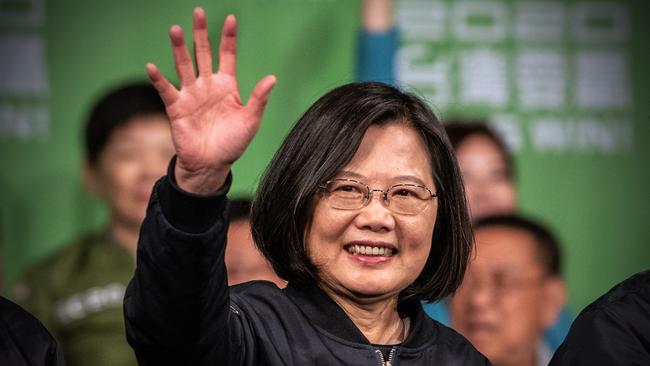
On the face of it, China is maintaining it is business as usual with Taiwan, but all indications are that the election could lead to a rise in cross-strait tensions with Taipei also potentially becoming a greater source of strain in Washington-Beijing relations.
Beijing’s Taiwan Affairs Office responded with its pro-forma view there was only one China, Taiwan was an inseparable part of Chinese territory and Taiwanese independence was “absolutely impermissible”. Furthermore, China would watch the words and the deeds of Tsai.
While this implies that Beijing will keep a wary eye on Tsai’s comments, the question is how much more aggressive China will become towards Taipei now the election is over.
Beijing has strongly objected to Tsai’s approach since she was first elected president in 2016, with formal exchanges between China and Taiwan suspended over her refusal to accept the “1992 consensus”, a political understanding in which both sides accept they are part of China but may differ on exactly what that means.
Beijing has made acceptance of this consensus, which was negotiated under a more Beijing- leaning Kuomintang government, as a prerequisite for talks between the two sides.
A more aggressive approach from Beijing could include renewed pressure on the 14 small nations that still recognise Taiwan to switch their diplomatic allegiance to Beijing, further isolating Taipei politically, as well as a potential step-up of Chinese air and sea activity in the Taiwan Strait.
The official Chinese newsagency Xinhua tried to dismiss the results of the election as a “temporary counter current” which was “just a bubble under the tide of the times”.
But other observers are taking a more wary view of future ties.
“The results of the election foreshadow rocky cross-strait relations in the years to come,” Macquarie University researcher Adam Ni wrote in his newsletter China Neican. “One that will get worse before it stabilises.”
Ni said that under Tsai, Taiwan would not accept reunification with China, particularly not under the one country, two systems model it uses to administer Hong Kong and Macau, and which was proposed by Chinese President Xi Jinping as a model for Taipei coming under Beijing’s administration. Ni predicts that Taiwan would continue to assert its identity and independence under Tsai’s clear mandate.
“Taipei will see these moves as ‘maintaining the status quo’ while Beijing will see these moves as undermining the status quo,” he says. “Beijing, Taipei and Washington do not see eye to eye on what constitutes cross-strait status quo.”
Ni predicts that while China will take measures to deter and punish perceived moves by Taiwan away from the status quo, these will have the opposite effect, likely contributing to a stronger Taiwanese identity and resistance.
In her victory speech on Saturday, Tsai made it clear she would continue to look for international support, despite the dwindling numbers of countries that officially recognise the island.
The Solomon Islands and Kiribati were the last two countries to shift their diplomatic recognition to Beijing, leaving only 14 member states of the UN backing Taipei.
The Trump administration has moved to strengthen ties with Tsai’s government with sales of more than $US2bn in military equipment including F-16 fighters and M1 Abrams tanks. US Secretary of State Mike Pompeo welcomed her re-election which showed the strength of Taiwan’s “robust democratic system”, describing it as a “model for the Indo-Pacific region and a force for good in the world”.
In words that will inevitably anger Beijing, he praised Tsai for “developing a strong partnership with the US” and applauded “her commitment to maintaining cross-strait stability in the face of unrelenting pressure.”
The China Daily has given an indication of Beijing’s thinking with an editorial urging Tsai to “dial down” her “confrontational approach” and accusing her of promoting “secession” to “curry favour with the US” and tapping into the unrest in Hong Kong, which it describes as an “upheaval instigated by the US”.
Ni argues that if China wants to win more hearts and minds in Taiwan it needs to take a more conciliatory approach, dropping its “authoritarian mindset and tool kit”. But, if anything, the re-election of a leader in Taiwan who Beijing so strongly dislikes is likely to be met with the opposite reaction which will only increase tensions in the region.
Regional players including Australia will be watching developments closely.




All eyes are on China’s response to resounding weekend re-election of independence-leaning Taiwanese President Tsai Ing-wen and her Democratic Progressive Party.